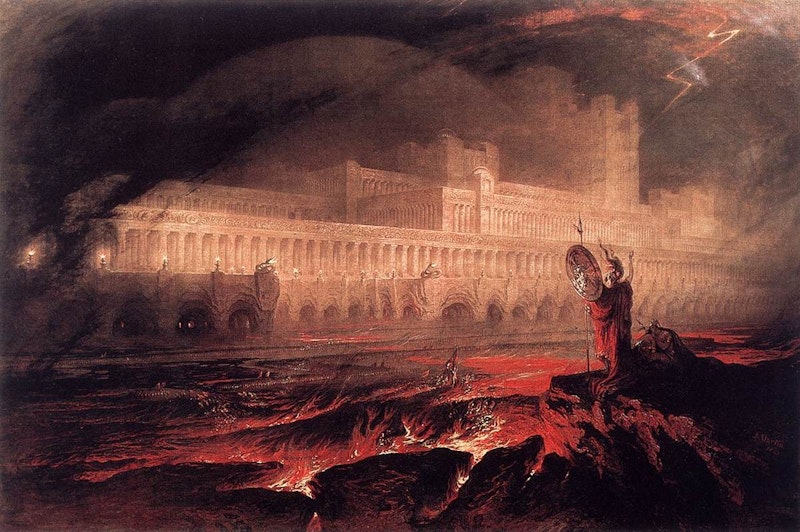I first read John Milton’s Paradise Lost years ago. I was struck by Milton’s description of the demon Belial which is found in the Catalog of Devils in Pandemonium, the Capital Of Hell. Belial’s the devil to whom “no temple stood nor altar smok’d” and who reigns “in luxurious cities where the noise of riot ascends above their loftiest towers.” Belial has no acknowledged temple, nor do his followers have any formal rites of worship (no altar, no incense), but is worshipped simply through one’s conduct and expression of values. He’s a god that one worships unknowingly. Can one really worship a god and be unaware of it?
Several years later this question was answered when I came across Science, Politics and Gnosticism by the German philosopher Eric Voegelin. He argues that the major political, philosophical and scientific movements of modern times, from the Hegelian Dialectic to Marxist Communism, from August Compte’s Positivism to the Nietzschean ideals of the Superman, are the unknowing expression of an ancient religious belief. Voegelin shows that Gnostic principles (the belief that the world’s an imperfect creation made by a cruel or at least uninterested god and it’s man’s purpose to remodel it into a state of perfection with his own hands) are in active force in the world yet no one is aware of it.
I’ve heard various slogans, personal mottos and declarations. One was Malcom Forbes’ statement “He who dies with the most toys, wins.” Another is “History is the dialectical movement towards the perfect communist state”. A more recent example is “Trust Science.” These are all statements of belief.
Though none claim to be religious, each of these slogans, in its own way, has religious overtones, each is a summing up of a position, a statement of values and belief. A belief explains things and, in the best cases, holds the hope that it’ll lead to a better world either personally or collectively. It may be politics, worldly fame, money or the belief that, given time, science will find the key to all of man’s woes.
We’ve been told for years, particularly in the West, that mankind has turned its back on God. It’s like an official dogma: “No progressive person can possibly believe in God.”
We’re told that God is a fairy tale, believing in God is a sign of weakness, of the incapacity to walk on one’s own two feet. Nietzsche proclaimed that God was dead and that we have no soul. Like Satan, who declared “I will not serve” we’re told that mankind has put its destiny in its own hands, that we must stop believing in the efficacy of prayer, in divine works and the redemption of Jesus Christ and trust in the miracles of human progress.
We’re currently living with the results of these convictions. For the last 250 years, from the Industrial Revolution to the invention of the locomotive and the airplane to the discovery of penicillin, science did promise the answers to worldly human concerns. Now the tables have turned. More and more people see science as a threat in the hands of a small group of people which will be used to control, manipulate and ultimately transform reality and humanity into some yet-to-be-determined entity. One could say that we’ve been duped, led into a wasteland of nothingness, of empty, unfulfilled promises and a soulless existence.
This isn’t the progressive victory we were told to expect. There’s a tacit message that resounds: “Just keep waiting, we’ll solve your problems and you’ll be happy! Meanwhile, shut up and consume while we perfect your chains.” It’s the very short end of a very long stick.
Can we be sure that we’re not unconsciously worshipping Belial in one form or another? Maybe, for we live—and die—by our beliefs. We should ask why there was this concerted effort to remove the True God from our lives and replace him with the false god of progress. Remember that misery loves company, particularly in Pandemonium.

